Although we have not been to many countries, for us, coming to beautiful Italy on our recent business trip was truly moving when we witnessed and felt the great hearts of the “ambassadors” with the mission of spreading Vietnamese culture in Italy. They are examples of Vietnamese teachers and students who are dedicated to building Vietnamese culture, sowing letters to develop the Vietnamese language, contributing to building a bridge of friendship, and sustainably developing the Vietnam - Italy strategic partnership in the present and the future.
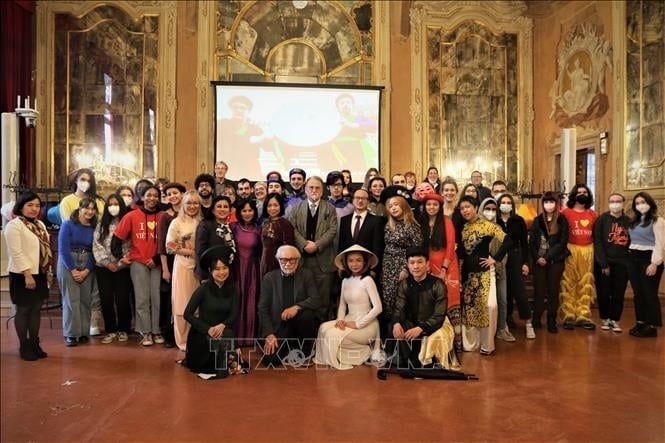
Teacher Le Thi Bich Huong and Vietnamese and Italian students performed in the program "Vietnamese Soul". Photo: VNA
Coming to Ca' Foscari University, we directly met the "ambassadors" of the Vietnam - Italy friendship, people who are truly dedicated, day and night concerned with the career of teaching Vietnamese in Italy. These are examples such as Professor Richard Tran Quang Anh, teacher Le Thi Bich Huong, and some new students from Vietnam to study in Italy. Among them, perhaps the most touching example is that of teacher Le Thi Bich Huong. Teacher Le Thi Bich Huong is from Viet Tri, Phu Tho, but has lived mainly in Sen Ho, Viet Yen, Bac Giang since she was a child. That is the hometown of one of the 49 ancient Quan Ho villages.
Sharing with our delegation, she confided: My parents do not work in the arts but have participated in this field. My father is an electrical engineer but actively composes, then joins the Vietnam Musicians Association. My mother is the same. My mother is one of the people who founded the Quan Ho Club in the village. She is the one who wrote new lyrics for songs in the Quan Ho folk tune, praising the Party, Uncle Ho, the homeland, the sovereignty of the sea and islands, and at the same time opened a free Quan Ho class for more than 50 children in Sen Ho village. Her paternal uncle is Tran Linh Quy, a Quan Ho researcher, former principal of Ha Bac Art College. Her paternal uncle is Tran Minh Chinh, a PhD in cultural studies, a folk culture researcher who has a rather large and elaborate research work on Quan Ho folk songs titled "Quan Ho Village Cultural Activities". The work was awarded the Vietnam Folk Literature Award in 2016 for its valuable contributions in both theory and practice to the cause of preserving, promoting and developing this unique folk song genre.
Perhaps that is why Quan Ho folk songs have been in her blood since she was a child, so when she came to Italy, she was like a "singer", always knowing how to flexibly combine, teaching Vietnamese and singing, bringing Quan Ho folk songs to students, scholars, and Italian friends who love Vietnam. And more preciously, teacher Le Thi Bich Huong is always passionate, responsible, and devoted to the cause of spreading Vietnamese. She is willing to teach extra hours for free when there are events and devotes all her personal efforts and money to organizing events to promote Vietnamese culture in Italy...
So what was the chance that Le Thi Bich Huong returned to Italy and became a teacher - an "ambassador" of Vietnam to promote the movement of teaching Vietnamese in Italy? In 2005, 18 years ago, when I was working in Brazil as the Executive Director of the Italy-Brazil Cooperation Project, a French-Vietnamese friend living and working in France asked me to teach her Vietnamese. Her purpose was to have Vietnamese so that she could talk to her relatives in Vietnam when she visited Vietnam. After that, I taught a few more people with the same purpose of helping them talk to their relatives in Vietnam.
After 10 years working in Brazil (2005-2015), I returned to Italy. I started the association of the Italian-Vietnamese cultural bridge and started teaching Vietnamese as a volunteer teacher for the association. Because in my opinion, having one more person who knows Vietnamese means one more person who knows about Vietnam. To be able to teach, I participated in a training course in Vietnam for Vietnamese teachers abroad organized by the Vietnamese Government through the Committee for Overseas Vietnamese. Then I taught Vietnamese to Vietnamese children adopted in Italy in a project sponsored by the city of Bologna. Since 2019, when the Vietnamese department was established, I applied and was accepted as a Vietnamese language practice lecturer for the Vietnamese Department at Ca' Foscari University until now.
Knowing that we are interested in the process of teaching and learning Vietnamese here, teacher Huong also frankly shared: Compared to "back home", teaching Vietnamese here with Italian students is very special and difficult, so we have to know how to improve the teaching method to "get in". The special thing is that Vietnamese is a new subject and compared to other Asian languages that have not been developed yet, the number of students studying it is very small compared to other subjects such as Chinese, Japanese, Korean.
It is also very difficult for foreigners to learn Vietnamese. Because Vietnamese has many tones, I thought of using traditional Vietnamese musical instruments (drums, cymbals) to help Italian students visualize the differences between tones due to different accents (For example, tung - low tone, cac - high tone, imitating the way we name the sound when we hit the drum face or the side of the drum) or cymbals (chập = heavy tone and cheng = empty tone/no tone). This is a special teaching method, a "creative" application that I named the Tung Cac pronunciation teaching method.
On the other hand, Italian students who enroll in the Vietnamese language department all want to learn about Vietnamese culture. Therefore, compared to other universities in Italy that have Vietnamese language departments, Ca' Foscari University is the only place that provides students with knowledge about history, literature, economics, geopolitics, art and all aspects of Vietnamese culture. In addition, the number of hours studying Vietnamese is not as much as other departments. There are 2 sessions per week (theory and practice), each session is 2 hours, with a total of 60 hours for a semester and 120 hours for the whole year, equivalent to 1 month and a half if studying 5 days a week and 4 hours a day. Students study two main languages, Thai and Vietnamese, with the same number of hours, but the number of students who go to Thailand for internships is 5 times the number of students who go to Vietnam for internships.
From that characteristic, we bring to students many forms of transmission so that they can both easily learn Vietnamese and easily perceive the unique features of Vietnamese culture through folk songs and traditional Vietnamese theater genres such as quan ho, cheo, cai luong, tuong co, water puppetry. Or through the poetic works of famous poets known to the world such as Nguyen Binh, Ho Xuan Huong and especially the Tale of Kieu by the great writer Nguyen Du...
And the seeds will eventually bear fruit. Teacher Huong excitedly said: The Italian students are very studious and show their love for Vietnam by accepting and actively participating in the extracurricular cultural activities that I initiated. Especially through learning to sing Vietnamese folk songs, they participated with great passion and responsibility. "Many times they had to practice in the park when they couldn't borrow a room or endure the cold in a room without a heater to listen to me teach the Tale of Kieu and practice reading the first verses of Kieu's poem". I have helped them develop their abilities and have created conditions to participate in all the cultural events that I initiated. Sometimes they even enthusiastically learn to sing and dance online until 11 pm. Among them, many of them have surprised me emotionally with their ability to perceive Vietnamese culture when they wrote their own programs and commentary for the performances.
I was particularly moved by the achievements of the Italian students in learning Vietnamese and in adopting Vietnamese culture. It was they, with their Vietnamese language and culture, who made the “Soul of Vietnam” program held a year ago shine. They introduced the glorious history of the land of the dragon and fairy - Vietnam through the flag dance performance “Dong mau Lac Hong”; introduced folk songs expressing the hospitality of the Vietnamese people in general and the Kinh Bac people in particular with the songs: Quan Ho “Moi nuoc muoi trau”, Cheo with the performance “Xúy Vân giả đại”, Cai Luong with “Tu dai oan” - Ba Ly He; the traditional Vietnamese New Year customs through the dance song “Tet que em”; introduced Nom poetry through the poem “Banh troi nuoc” by poet Ho Xuan Huong, the new poetry movement through the poem “Chan que” by poet Nguyen Binh; introduced a very unique art of Vietnam, water puppetry and the masterpiece of Nom poetry “Truyen Kieu” by Nguyen Du.
That's true. Italian students, students and Vietnamese people studying and working at Ca' Foscari University when talking to us all expressed their excitement about the way Vietnamese is taught here.
Student Tommaso Becchi confided: When I chose to study Vietnamese at the age of eighteen, it was for many reasons. First of all, I was attracted by the history of Uncle Ho's country: Knowing the language is necessary to penetrate the culture of a country, especially an ancient country like Vietnam. Regarding this, I am glad that after only a few months, I have a more comprehensive view of many historical events.
However, when I chose this university path, it was not only to have a more complete view of the past, but also the opportunity to experience the present and the future. Today, anyone who knows Vietnamese is connected to a country of 100 million people and a rapidly growing economy.
I am very happy with my choice to learn Vietnamese. Now, I can't wait to go to Vietnam to walk around Hanoi's Old Quarter and see the skyscrapers of Ho Chi Minh City!
Student Nawal Rebib said: Fascinated by the cultural diversity of Southeast Asia, I chose to study Vietnamese. Thanks to the dedicated teaching of the teachers, I have learned the basics of Vietnamese. I am very satisfied with the results and can't wait to be able to apply it in practice in Vietnam. Second-year students like me wish to have the opportunity to do an internship in Vietnam, the country of Uncle Ho, to further improve our Vietnamese and practice what we have learned during these years at Ca Foscari University. Unfortunately, there are not many study programs at universities in Vietnam and internship opportunities in Vietnam. On the occasion of the 50th anniversary of Vietnam - Italy relations, we hope that the Vietnamese Government will create conditions for us to realize this wish.
Student Chiaral Venturi, shared: We believe that being able to do an internship in Vietnam is an essential experience to fully and deeply understand what we learn in class. In fact, studying or working in Vietnam for a period of time allows us students to improve our language and history of the country, but above all to get in touch with the wonderful culture of Vietnam, of which we can only perceive a small part in the classroom. Under the direction of Ms. Huong, we organized several events to celebrate and honor Vietnam and the traditions of this beautiful country. For us students, it would be ideal if we could receive from the Vietnamese Government assistance, which could be traditional materials and objects, Vietnamese books, help in compiling dictionaries, etc. These requests demonstrate our students' interest and desire to be able to study more deeply and improve what we are learning, with the hope that our relationship with the Vietnamese government will be further strengthened.
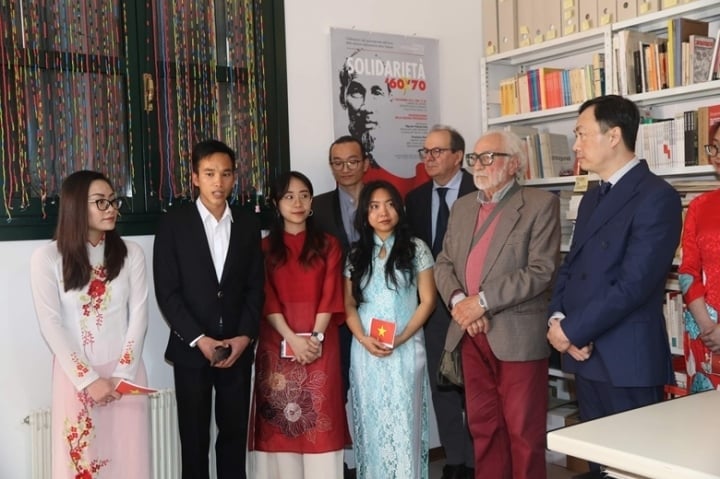
Postdoctoral researcher Pham Hung Vuong (second from left). Photo: TG
Pham Hung Vuong, from his hometown of Thai Binh, is currently a postdoctoral researcher at Ca'sfocari University. I really like the way Vietnamese is taught here. The way Vietnamese is taught here always attracts Italian students. I also study a little here and sometimes teach my Italian colleagues and some international friends simple Vietnamese sentences for communication. They are very excited to learn because they have learned and heard about Vietnamese tourism, Vietnamese cuisine, and especially the country of Ho Chi Minh. They love to participate in extracurricular activities such as cooking and performing arts because they feel new and curious about Vietnamese cuisine and culture. I think we should not be too burdened with organizing big events, we should do things that seem small but effectively promote the friendly relationship between the two countries. For example, promote culture, cuisine, and internship opportunities in Vietnam so that students feel they can use Vietnamese after graduation. Promotion can be through exchanges between the Friendship Associations of the two countries (Italy-Vietnam Friendship Association and Vietnam-Italy Friendship Association) so that children of Italian friends know more and spread their influence. Internship and work opportunities can be through links between Italian-Vietnamese universities and Vietnamese-Italian businesses to create short-term exchanges between the two countries.
Student Nguyen Thi Hien Thao, from Hai Phong city. Currently studying at the Faculty of Business Administration of Ca'sfocari University, said: There are not many Vietnamese students studying here. However, we always know how to unite, support each other, turn to the Fatherland, voluntarily study well and strictly comply with the laws of the host country. I have mobilized many other friends to voluntarily find ways to spread Vietnamese in the Vietnamese community and always connect with teachers, as well as Italian students studying Vietnamese in events promoting Vietnamese culture in Italy in general and Venice in particular. When I heard that the Vietnamese delegation was visiting the school, I was so happy and excited that I felt indescribable for several days. As someone who loves painting and was honored to be with the students to welcome the delegation, I was aware and took the time to draw a picture to give to the Head of the delegation. The picture is called: "Vietnam - Italy Flow." Through this painting, I want to send a message expressing the wishes of international students in Italy to always turn towards their homeland, successfully integrate, while still preserving Vietnamese cultural identity. Always turn towards the beloved Fatherland with the dream of studying well, learning a lot of new knowledge in a foreign land.
What the students shared is completely true. Directly talking to the delegation of the Communist Party of Vietnam led by Party Central Committee Secretary Nguyen Trong Nghia, the statements of the leaders of Ca' Foscari University in Venice all affirmed that the Vietnamese language department has been developing well. The school will wholeheartedly support the maintenance and development of the Vietnamese language department here. The students studying Vietnamese love Vietnam very much, so they study very attentively and diligently to learn about Vietnamese culture.
Ms. Le Thi Bich Huong proudly shared: We are very happy to have maintained and developed the Vietnamese class over the past 4 years. And we are very happy that the department in 2022 had its first Vietnamese bachelors graduate. Our successes are just the beginning. That success is the work of the whole team. Those are the important contributions of the head of the department, Mr. Marco Ceresa, and Mr. Tran Quang Anh who created the department.
As we have confided, we do everything we can to sow the Vietnamese language in your land, and to help many Italians understand the cultural traditions of our Vietnamese people. And the greatest source of encouragement is the academic achievements and sincere thanks from the Italian students: “I would like to thank Professor Richard Tran Quang Anh and teacher Huong for always following us for the past 3 years. With their teaching, the teachers have made us passionate about Vietnamese and participating in cultural events like this. Vietnamese is very difficult for Italians, but Ms. Huong has helped us with pronunciation and inspired us to discover new things about Vietnam. When participating in events like this, in addition to learning basic knowledge, we also have fun, play different roles and make us feel like we are really in Vietnam …” (excerpt from Valentina Granata's speech at the event Hon Viet, February 2022).
“… I like learning Vietnamese more than some other Asian languages. Because I like Vietnamese, in just a few months my class was able to perform the play Kieu. I think that is a good way to develop an interest in Vietnamese. I am very happy to learn Vietnamese in Venice!” (excerpt from Tommaso Becchi’s essay)
“Thank you for all the passion and love you have for teaching Vietnamese. Thank you for always making us feel that you are proud of your students and I can also say that I am very proud to have a teacher like you” (quoted from student Annastasia Badin when she graduated with her bachelor's degree on October 13, 2022)
It is heartwarming that the confidences and wishes of the teachers and students of Ca's Focari University have been thoroughly answered by the Working Group and they can rest assured with the upcoming development policies and directions on promoting educational cooperation, encouraging the development of the language and culture of each country. Dr. Ngo Thi Minh, Deputy Minister of Education and Training, shared with the school leaders, teachers and students: At the working session with the Director General of the Italian Ministry of Higher Education on April 17, 2023, the two sides agreed to advise the Ministers of the two countries to promote educational cooperation; promote the results, continue to implement the action program of the two Governments on educational cooperation for the period 2019-2022. In particular, promoting cooperation in language development, cooperation in the field of education and providing scholarships. The two sides also agreed to continue advising the two governments in the following direction: Vietnam will continue to provide annual scholarships for Italian citizens to study Vietnamese or receive short-term training while working; Italy will promote the provision of textbooks, as well as audio-visual aids and other educational materials to Vietnamese general education institutions to teach Italian and train and foster teachers and teaching assistants...
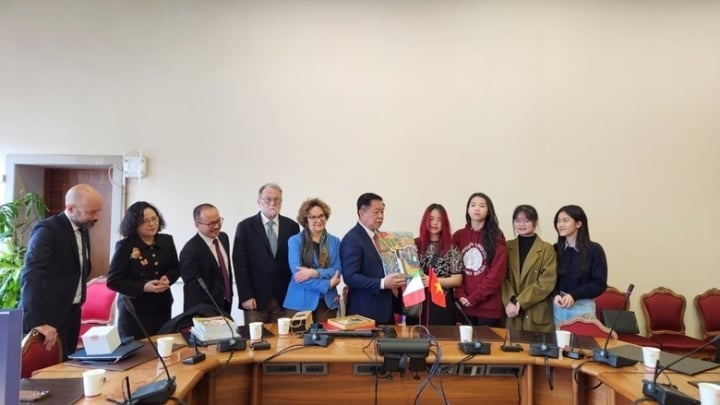
Student Nguyen Thi Hien Thao presented the Head of the delegation with the painting "Vietnam-Italy Flow".
In particular, Secretary of the Party Central Committee, Head of the Central Propaganda Department Nguyen Trong Nghia affirmed: The Vietnamese language teachers here have done very well. You yourselves have done a very valuable job. You are the important factors contributing to preserving the Vietnamese national soul in the Vietnamese community in the host country. And you are also the "ambassadors" spreading the Vietnamese cultural values to act as a bridge and develop the Vietnam-Italy friendship. The recommendations of the school, teachers and students are very legitimate. The Ministry of Education and Training together with relevant ministries and branches need to soon study and advise the Government and the host country to have policies and strategies to remove and resolve the problems, in order to create the best conditions for Vietnamese language teachers and Italian students to study Vietnamese.
To conclude this article, I think we can fully expect that the career of teaching and learning Vietnamese in Italy will open up a new future. I think that if countries with a large Vietnamese population could also develop a movement to teach Vietnamese and have “ambassadors” to spread Vietnamese language and culture like in Italy, it would be very practical. Because only then, in the long run, the Vietnamese community can preserve the national soul and be a bridge of friendship with the host countries./.
(Source: Communist Party Electronic Newspaper)
Useful
Emotion
Creative
Unique
Wrath
Source



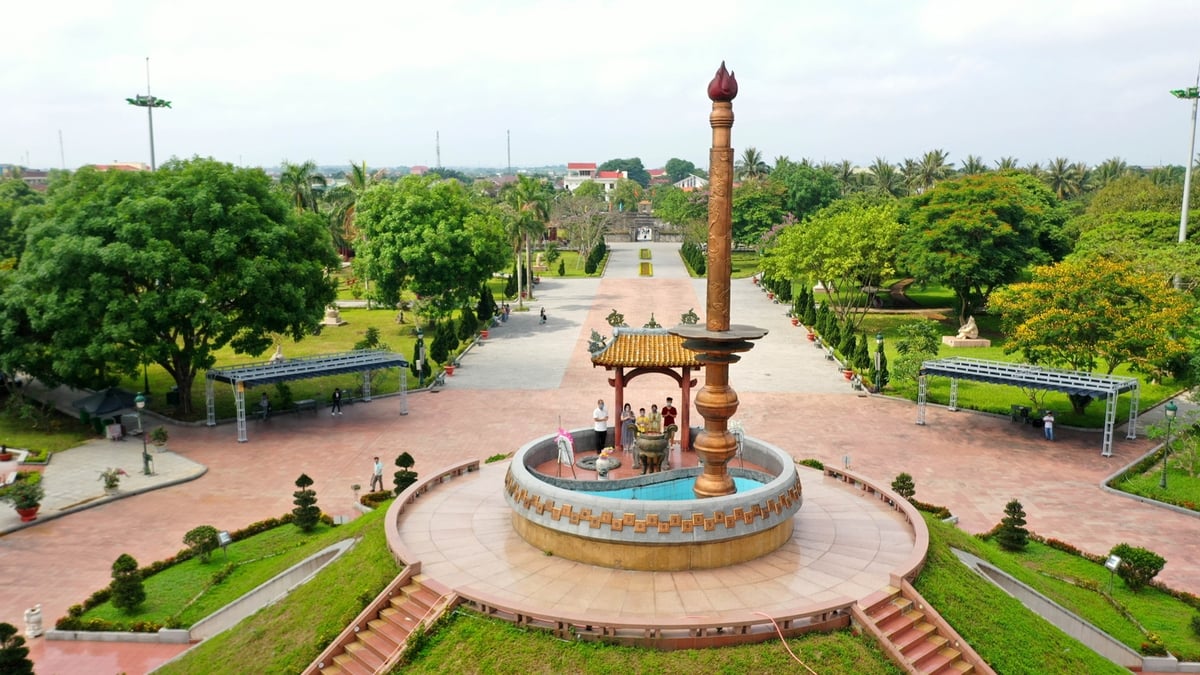

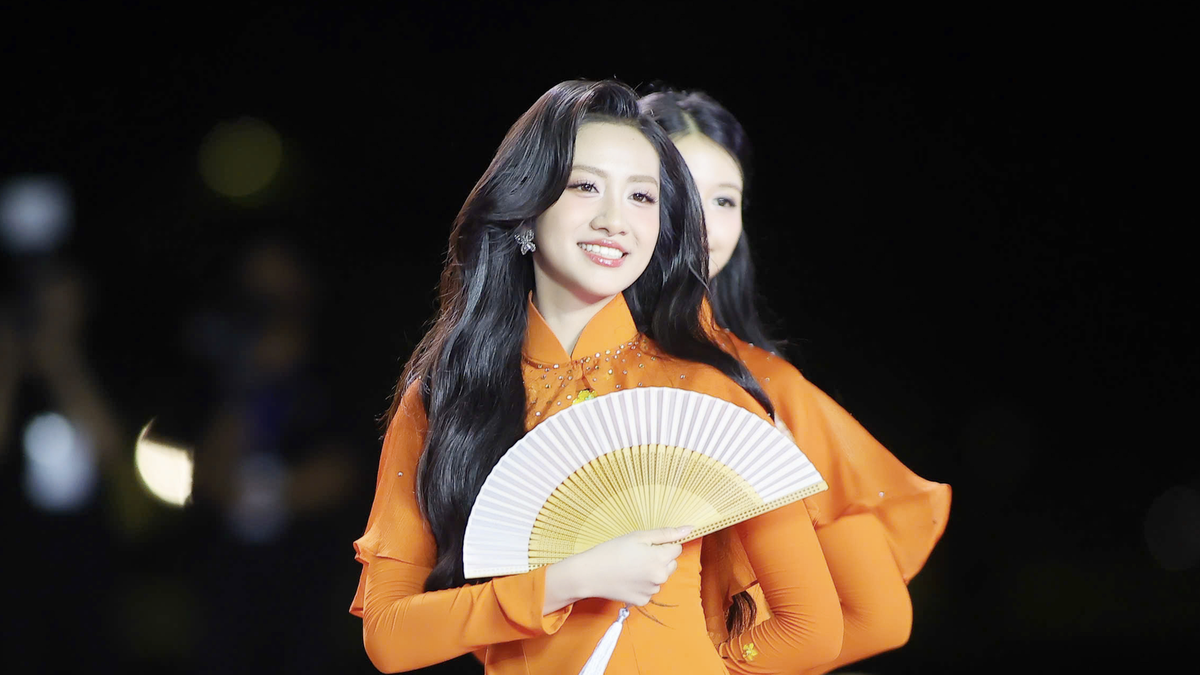






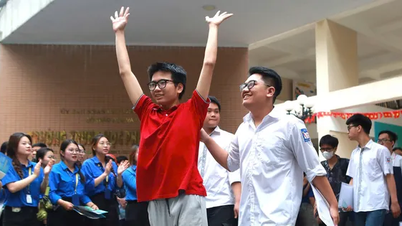

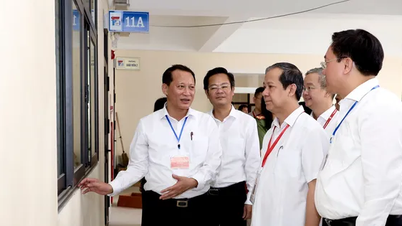
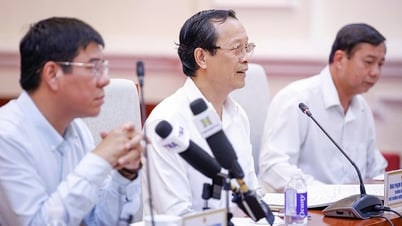
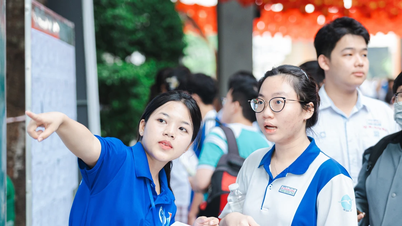







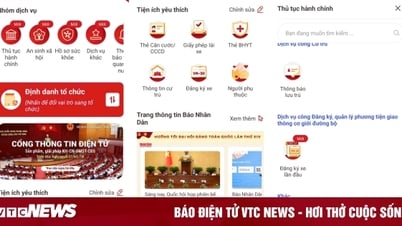
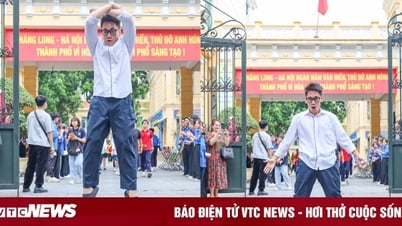
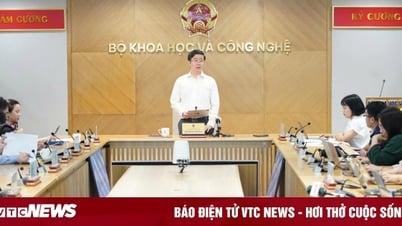



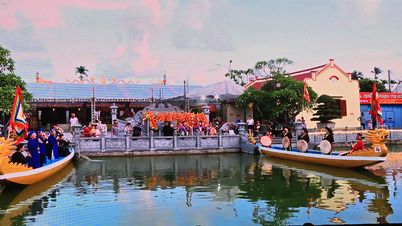

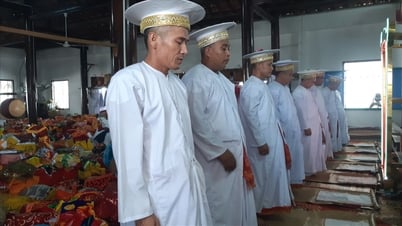

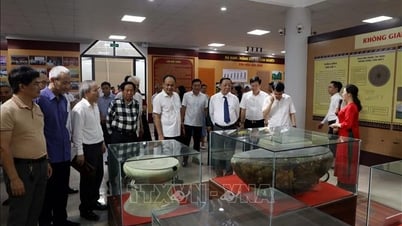

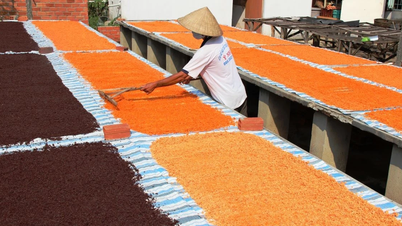

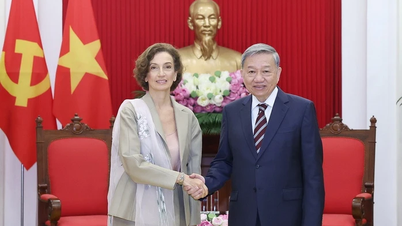

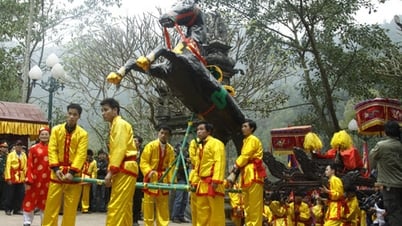


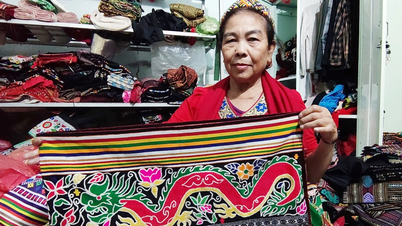

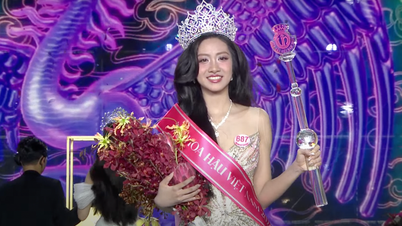



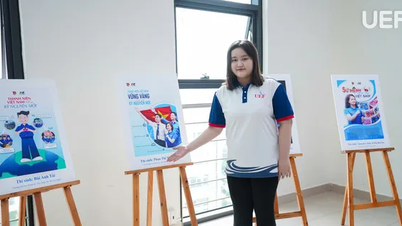










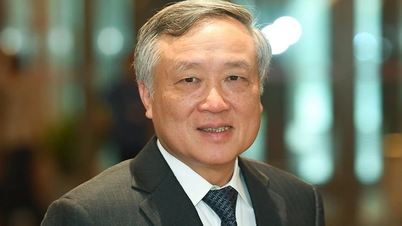
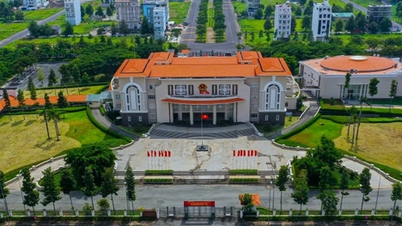


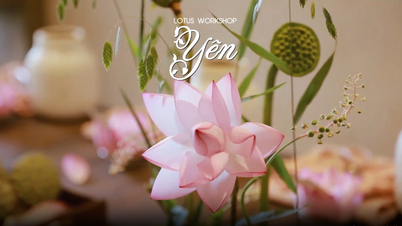

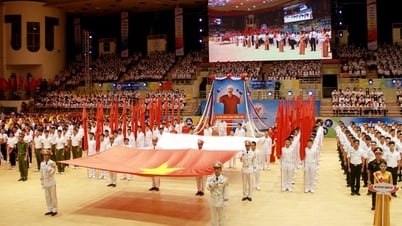

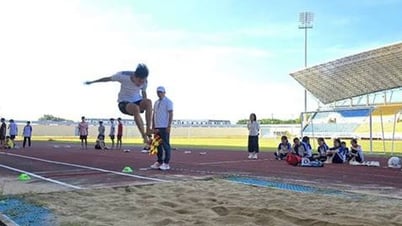
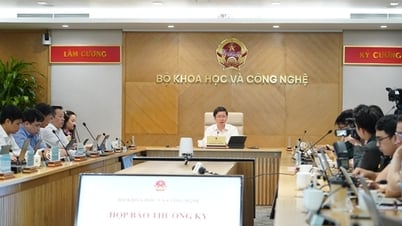

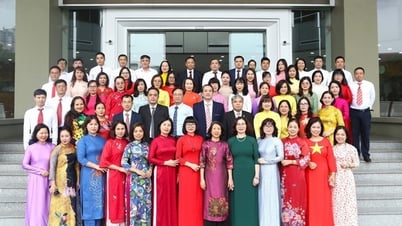
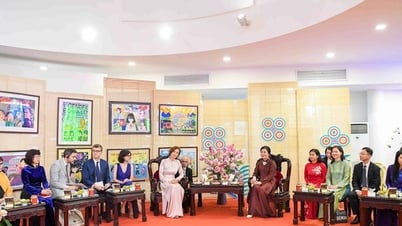
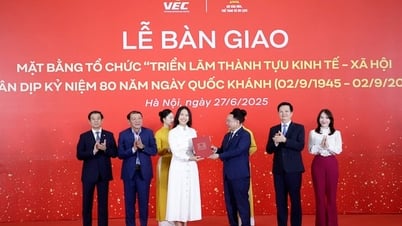


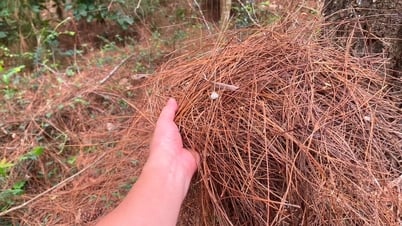

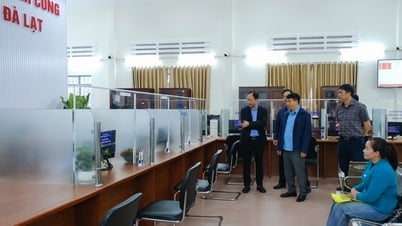

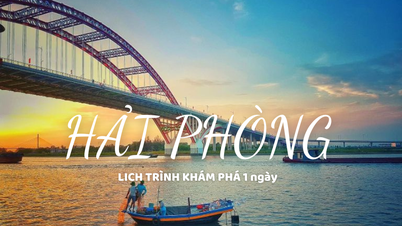
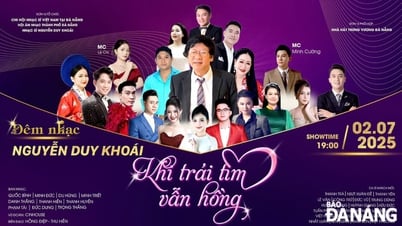

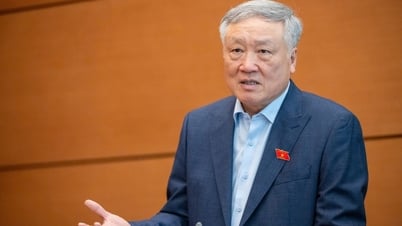














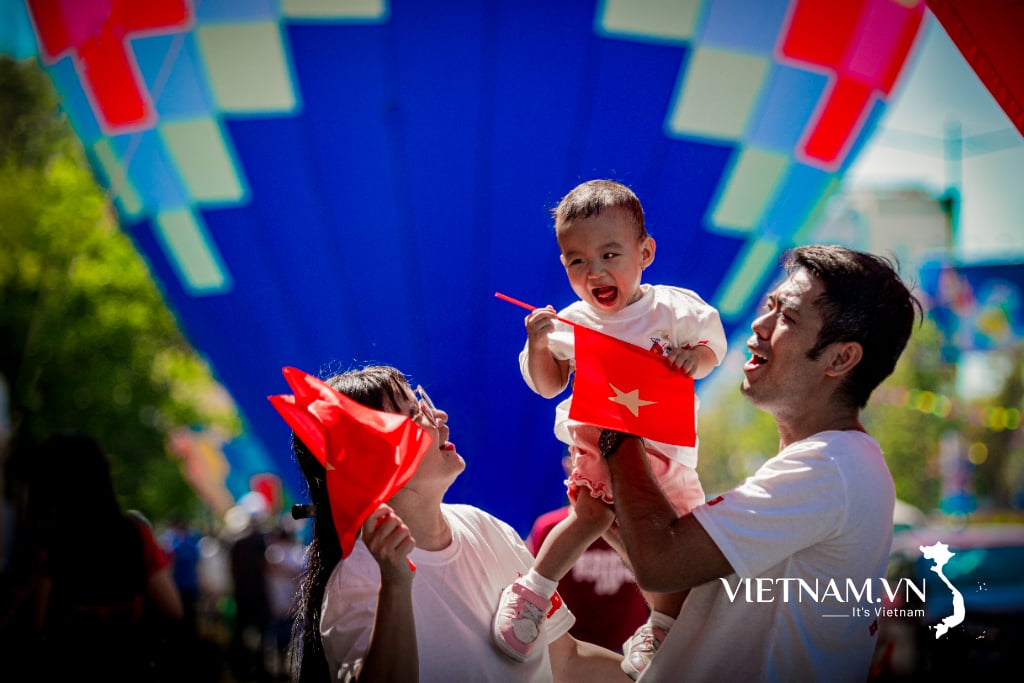
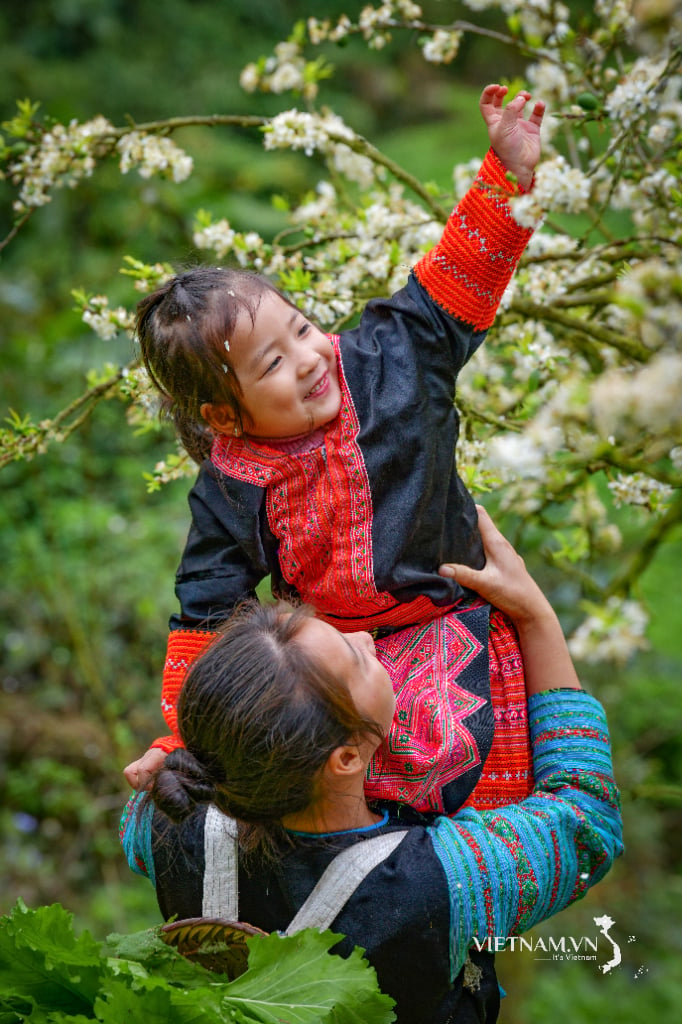

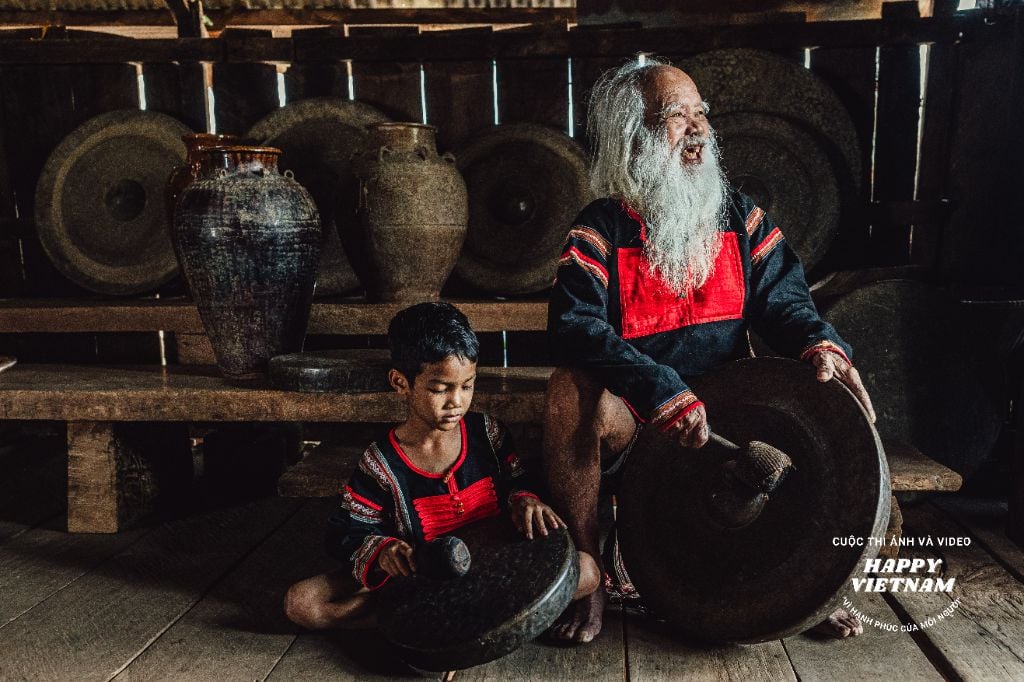
Comment (0)